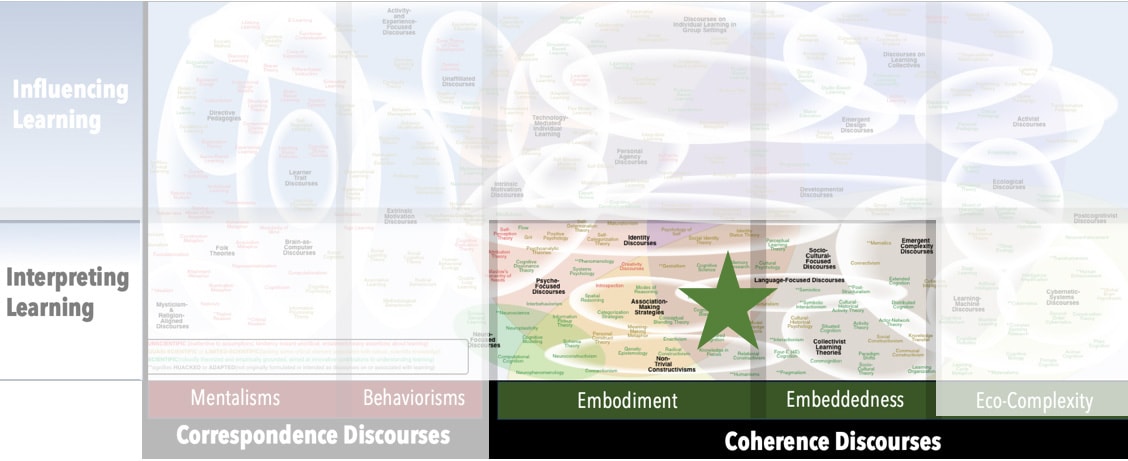Focus
Self-sufficiency of the human species from generating knowledgePrincipal Metaphors
- Knowledge is … all verified assertions
- Knowing is … acting, interpreting
- Learner is … humanity
- Learning is … expanding knowing
- Teaching is … enabling, affording access
Originated
1300sSynopsis
The category of Humanisms encompasses a range of perspectives that reject any system of belief that relies on spirits, deities, or other mystical forces as sources or arbiters of truth. Rather, Humanisms assert that humans can and must generate insight for themselves. The sensibility dates back millennia, but its most powerful articulations have been relatively recent, starting with the Enlightenment and the associated rises of Empiricism and Rationalism. Prominent strands that have particular relevance to education include:- Evolutionary Humanism (Julian Huxley, 1950s) – a version of Humanism that incorporates principles of Universal Darwinism, thus concerned with shaping the species’ future by bringing the conclusions of evolutionary science (e.g., on matters of human cognition, sociality, and diversity) to bear on such matters of ethics, well-being
- Humanistic Psychology – a 20th-century movement in psychology, in reaction to Psychoanalytic Theories and Behaviorisms, with a focus on mental well-being and healthy development (see Positive Psychology)
- Liberal Humanism – a perspective that sees “human possibility” as rooted in the individual, and thus places matters of personal rights and liberty among the highest ethical priorities
- Posthumanism – a cluster of perspectives that share a conviction that “humanity” will and must be fundamentally redefined. Associated constructs include:
- Non-Technological Posthumanization – any non-technical process that entails a rethinking of what it means to be human, including some ancient events such as the domestication of animals or the invention of formal religions
- Technological Posthumanization – the use of emergent technologies to alter physical, psychological, social, and/or cultural forms in a manner (or to an extent) that notions of “humanity” are affected – in effect, pressing into the realm of Transhumanism
- Secular Humanism – emerging in the mid 1900s, a version of Humanisms that that explicitly rejects religion-based construals of truth and morality, along with such notions as sin and afterlife. Some versions of Secular Humanism emphasize the embrace of human diversities, including in belief, sexuality, and ethics.
- Socialist Humanism – associated with Marxist thinking, a perspective that positions equality among humans as among the highest ethical priorities
- Existentialism (Jean-Paul Sarte, Albert Camus, 1930s) – often affiliated (and sometimes conflated) with Humanisms, Existentialism rejects the notions that one might have a pregiven purpose, that there is inherent meaning in existence, and that there are universal standards for human life. Consequently, individuals are compelled to construe their own meaning and purpose and are free to choose how they live. As an educational perspective, Existentialism is associated with affording freedom and nurturing agency. Prominent associated discourses include:
- Existential Phenomenology (Martin Heidegger, 1910s) – a turn from the original focus of Phenomenology, which was to achieve direct apprehension of a phenomenon at its most fundamental level, toward the careful and systematic analysis of the “lived experience” of that phonemenon – that is, to understand the meaning of that phenomenon within one’s world
- Existential Psychology (Ludwig Binswanger, 1940s) – as the title suggests, a branch of Psychology that is informed by Existentialism – and that, consequently, emphasizes subjective experience and personal responsibility
- Being-in-the-World (Dasein) (Martin Heidegger, 1930s) – a notion drawn from Existentialism that has to do with the situated and ever-evolving nature of human identity. Being-in-the-World is about meaning and growth – which, while applicable to all humans, is unique to/for each individual. (Dasein means, literally, “being there.”)
- Transhumanism – addresses the development, use, and distribution of technologies to enhance intellect and physiology, rooted in a confidence that eventual benefits will outweigh health, social, ethical, and other issues and dangers
- Humanities – those academic disciplines that focus on aspect of human existence – but that, in contrast to the emphasis on empirical research in the Human Sciences (see Sociology), take predominantly critical, analytical, and creative approaches. The Humanities are often defined in terms of what they are not – namely fields associated with professions, the natural sciences, or the Social Sciences. (Some commentators include mathematics among the Humanities; most don’t.) Foci of the Humanities include art, culture, languages, literature, philosophy, religion, and worldviews, among many others.
- Environmental Humanities (Ecological Humanities) (2010s) – a multidisciplinary field that brings together many of the Humanities around the conviction that environmental and cultural issues cannot be considered separately
Commentary
As might be expected, the first reactions to Humanisms were anchored in belief systems that rely on supernatural and omnipotent constructs. Those criticisms persist. In an interesting parallel, prominent contemporary criticisms from more secular positionings often focus on limitations – asserting, for example, that the more-than-human world is inadequately considered in most Humanisms.Authors and/or Prominent Influences
DiffuseStatus as a Theory of Learning
Humanisms are not theories of learning, per se. However, in challenging and reformatting a range of once-entrenched epistemological assumptions, they can be properly construed as profoundly interested in matters of learning.Status as a Theory of Teaching
Humanisms are not theories of teaching, but they are integrally associated with the emergence of state-funded, universal public schooling.Status as a Scientific Theory
The question of whether Humanisms are scientific is an odd one, because modern science is rooted in humanist thinking. That is, it is more appropriate to say that modern science is humanistic than it is to say that Humanisms are scientific.Subdiscourses:
- Being-in-the-World (Dasein)
- Environmental Humanities (Ecological Humanities)
- Evolutionary Humanism
- Existential Phenomenology
- Existential Psychology
- Existentialism
- Humanistic Psychology
- Humanities
- Liberal Humanism
- Non-Technological Posthumanization
- Posthumanism
- Secular Humanism
- Socialist Humanism
- Technological Posthumanization
- Transhumanism
Map Location

Please cite this article as:
Davis, B., & Francis, K. (2023). “Humanisms” in Discourses on Learning in Education. https://learningdiscourses.com.
⇦ Back to Map
⇦ Back to List
